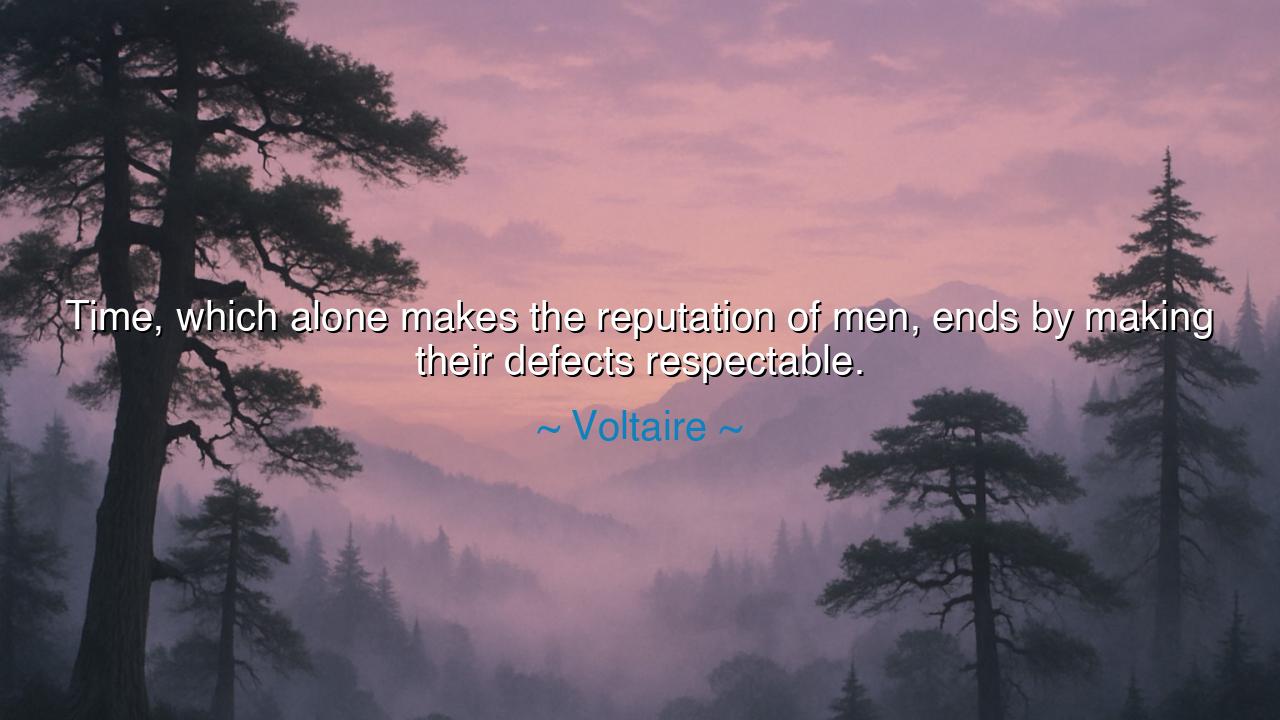
Time, which alone makes the reputation of men, ends by making
Time, which alone makes the reputation of men, ends by making their defects respectable.






In the piercing words of Voltaire, the sage who wielded wit as a sword and truth as a torch, we find one of the most haunting reflections on human legacy: “Time, which alone makes the reputation of men, ends by making their defects respectable.” In these words lies a paradox older than civilization itself — that Time, the silent judge of all things, softens the harshness of human flaws, turning what once seemed ignoble into something revered, or at least forgiven. It is not merely an observation about memory; it is a meditation on how the passing of years transforms judgment into reverence, and imperfection into myth.
Voltaire, that master of irony, understood the frailty of human perception. He had seen how men condemned in their age become saints in the next; how the rebels of one century become the heroes of another. Time, he knew, has the power to reshape not only the fate of nations but the image of the soul itself. What was scandalous becomes daring; what was arrogance becomes confidence; what was cruelty becomes strength. Humanity, weary of judging, learns instead to admire. And so, through the alchemy of memory, even the defects of great men are gilded by their achievements, their sins polished smooth by the erosion of centuries.
The ancients saw this truth long before Voltaire gave it voice. Consider Julius Caesar, whose thirst for power shattered the republic he claimed to protect. In his day, he was slain as a tyrant; his name was spoken with fear and fury. Yet Time, that tireless sculptor, carved away the blood and left the marble of glory. Today, his name stands not for betrayal, but for leadership, genius, and empire. His ambition, once condemned, has become the measure of greatness. Thus does Time make even defects respectable — for in the shadow of centuries, the lines between virtue and vice blur into legend.
Or take Vincent van Gogh, tormented by madness and rejection, dying in obscurity, mocked as unstable and worthless. In his age, his wild colors were seen as disorder; his brushstrokes, as chaos. Yet Time, with its patient grace, revealed that his so-called defects were the very language of genius. What once seemed the mark of failure is now celebrated as divine originality. His pain became the palette of eternity. So it is with many souls — their struggles, scorned in life, become symbols of courage once Time has softened the gaze of the world.
Voltaire himself was no stranger to this transformation. In his day, he was denounced by kings and priests alike — called blasphemer, seducer, corrupter of youth. Yet Time has rendered his sharp tongue and rebellious spirit not scandalous but noble. His irreverence became the seed of enlightenment; his defiance, the anthem of liberty. Thus, Time, which once condemned him, has made his very defects the proof of his greatness. The boldness that once offended became the brilliance that awakened nations.
And yet, this truth bears both comfort and warning. For if Time can sanctify the flawed, it can also deceive the living. The passage of years can dull the edge of truth, turning even cruelty into charm. A tyrant’s ambition, a conqueror’s vanity, a thinker’s arrogance — all may be clothed in dignity by the long veil of memory. Therefore, the wise must look beneath the adornments of history and ask: was it true virtue that endured, or merely the patience of Time polishing what it could not erase? For not all that becomes respectable deserves reverence.
Still, there is a sacred hope in Voltaire’s observation. It reminds us that we are not imprisoned by our present faults, nor condemned forever by the judgments of our time. If we labor toward greatness, Time may yet redeem our imperfections, showing that even in our weakness there was purpose, even in our flaws there was humanity. The river of Time does not only wear away — it also refines. To live nobly, then, is to act with the awareness that though we may stumble, our efforts may still, in the fullness of years, bear fruit for generations to come.
Therefore, my child, remember this: Time is both the destroyer and the redeemer. Live so that when its slow hand passes over your memory, it finds something worth forgiving, something worth admiring. Do not fear your defects, but strive that they be the shadows of your light, not its absence. For if you live with truth, Time will make your faults respectable, your struggles meaningful, and your name — though once misunderstood — an echo of wisdom for those who follow.






AAdministratorAdministrator
Welcome, honored guests. Please leave a comment, we will respond soon